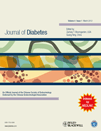RESEARCH LETTER
Effect of daily vitamin D supplementation on HbA1c in patients with uncontrolled type 2 diabetes mellitus: A pilot study*
Mate M. SORIC,
Mate M. SORIC
Flower Hospital Family Medicine Residency, Sylvania
Search for more papers by this author Elizabeth T. RENNER,
Elizabeth T. RENNER
The Toledo Hospital Family Medicine Residency, Toledo, Ohio, USA
Search for more papers by this author Steven R. SMITH,
Steven R. SMITH
The Toledo Hospital Family Medicine Residency, Toledo, Ohio, USA
Search for more papers by this author
Mate M. SORIC,
Mate M. SORIC
Flower Hospital Family Medicine Residency, Sylvania
Search for more papers by this author Elizabeth T. RENNER,
Elizabeth T. RENNER
The Toledo Hospital Family Medicine Residency, Toledo, Ohio, USA
Search for more papers by this author Steven R. SMITH,
Steven R. SMITH
The Toledo Hospital Family Medicine Residency, Toledo, Ohio, USA
Search for more papers by this author
First published: 21 October 2011
Mate M. Soric, Northeast Ohio Medical University College of Pharmacy, 4209 State Route 44, PO Box 95, Rootstown, OH 44272, USA. Tel: +1 330 325 6226 Fax: +1 330 325 5951 Email:
[email protected] No abstract is available for this article.
References
- 1
Looker AC,
Dawson-Hughes B,
Calvo MS,
Gunter EW,
Sahyoun R.
Serum hydroxyvitamin D status of adolescents and adults in two seasonal subpopulations from NHANES III.
Bone. 2002; 30: 771–7.
- 2
Scagg R,
Sowers M,
Bell C.
Serum 25-hydroxyvitamin D, diabetes, and ethnicity in the Third Health and Nutrition Examination Survey.
Diabetes Care. 2004; 27: 2813–8.
- 3
Pittas AG,
Dawson-Hughes B,
Li T
et al.
Vitamin D and calcium intake in relation to type 2 diabetes in women.
Diabetes Care. 2006; 29: 650–6.
- 4
Nikooyeh B,
Neyestani TR,
Farvid M
et al.
Daily consumption of vitamin D– or vitamin D+ calcium-fortified yogurt drink improved glycemic control in patients with type 2 diabetes: A randomized clinical trial.
Am J Clin Nutr. 2011; 93: 756–63.
- 5
Shoff SM,
Mares-Perlman JA,
Cruickshanks KJ,
Klein R,
Klein BEK,
Ritter LL.
Glycosylated hemoglobin concentrations and vitamin E, vitamin C, and beta carotene intake in diabetic and nondiabetic older adults.
Am J Clin Nutr. 1993; 58: 412–6.




